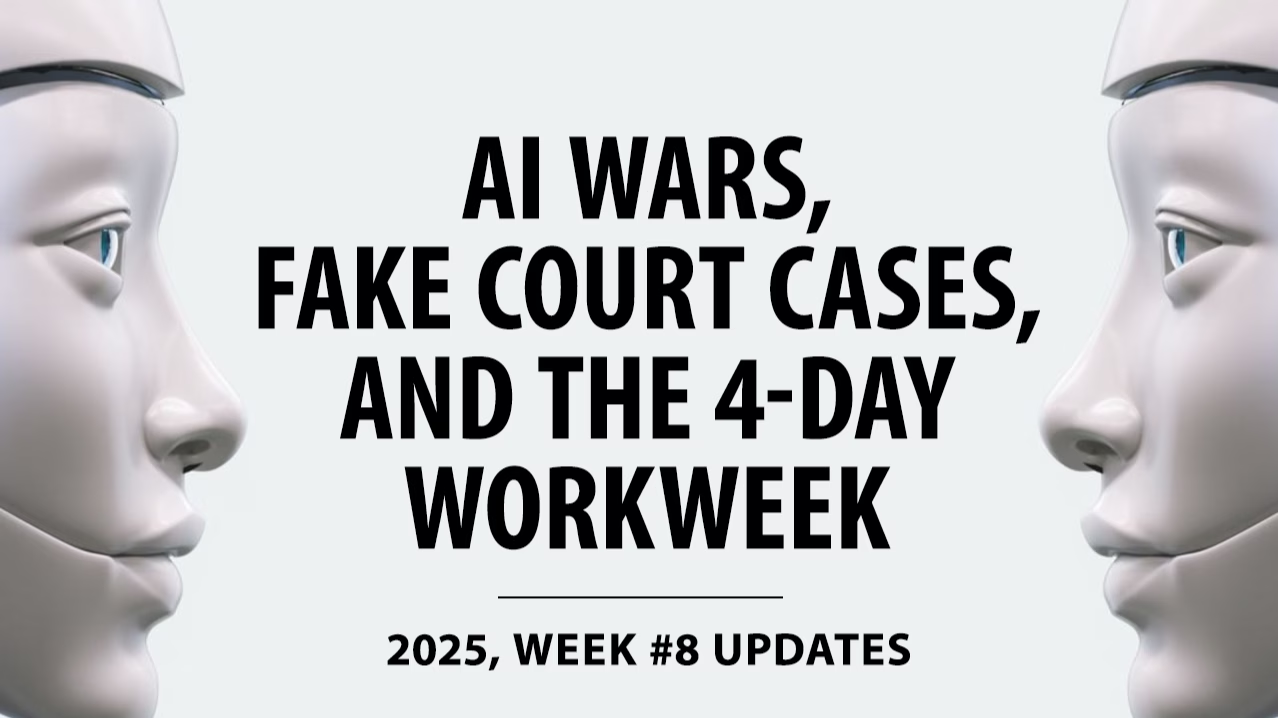The world of artificial intelligence is evolving rapidly. This week, several key developments caught everyone’s attention. From Elon Musk’s intensifying rivalry with OpenAI to major law firms facing challenges with AI-generated mistakes, and new research suggesting that AI might finally make a four-day workweek possible, there is a lot to unpack.
1. AI’s Power Struggle: Musk vs. OpenAI vs. China
Elon Musk is once again making headlines with his startup, xAI, which is launching Grok 3 and claiming it to be the “smartest AI on Earth.” Meanwhile, OpenAI stood its ground by rejecting Musk’s massive $97.4 billion buyout offer. This decision highlights OpenAI’s confidence in its independence and growth potential.
However, the battle is not limited to U.S. companies alone. China’s DeepSeek AI has quickly surpassed ChatGPT in App Store downloads, illustrating that the AI race is now a global competition.
Will established players like Elon Musk, OpenAI, Google, and Microsoft maintain their dominance, or could China take the lead?
Key Takeaways:
- Elon Musk’s xAI enters the race with Grok 3.
- OpenAI remains independent, refusing Musk’s offer.
- China’s DeepSeek AI emerges as a formidable competitor.
2. AI Is Wrecking Businesses That Rely on It Too Much
While AI provides remarkable tools, it’s important to remember the risks. Some companies place too much trust in AI, leading to costly errors. Here are the main issues:
- Blind trust in AI outputs. AI can produce incorrect information.
- Ignoring AI security vulnerabilities. Data leaks and privacy risks are real.
- Automating the wrong tasks. Human oversight remains crucial.
AI should assist, not replace strategic thinking. Companies that fail to grasp this may face failure.
How are industry leaders like Salesforce, IBM, Forbes, and TechCrunch managing AI risks?
Action Points:
- Conduct regular AI audits to ensure accuracy.
- Maintain data security protocols.
- Use AI as a tool, not a decision-maker.
3. Is AI the Key to a Four-Day Workweek?
New research indicates that AI could automate 53% of work tasks, including scheduling, emails, and data analysis. So, why are we sticking to the traditional five-day workweek?
The challenge lies in leadership. Companies need to rethink productivity measures and develop policies that allow AI to manage repetitive tasks. This would enable employees to focus on creative and strategic work.
Will influential companies like LinkedIn, Microsoft, Asana, Slack, and Zoom drive the four-day workweek into reality?
Strategic Steps:
- Redefine productivity metrics.
- Foster a culture of innovation over hours worked.
- Encourage flexibility and work-life balance.
4. AI in Courtrooms: A Disaster in the Making
Recently, a major law firm faced potential sanctions after submitting AI-generated legal briefs filled with fake case citations. AI’s tendency to “hallucinate” poses significant risks in high-stakes environments like law.
Judges are issuing warnings, stating that lawyers must verify all AI-assisted legal work before submission.
Should AI be banned in legal research?
Considerations:
- Ensure manual review of AI outputs before submission.
- Invest in AI training for legal professionals.
- Establish clear guidelines for AI usage in law.
5. Adobe Takes on OpenAI’s Sora With AI Video Editing
Adobe has introduced a video generator that rivals Sora, enabling users to create 1080p clips in seconds. This innovation could transform content creation, marketing, and entertainment. However, it raises questions around copyright, deepfakes, and creative ownership.
How will companies like Adobe, OpenAI, Runway, YouTube, and Meta adapt to these changes?
Focus Areas:
- Address copyright and ownership concerns.
- Set ethical guidelines for video content creation.
- Explore new business models for AI-driven content.
6. TikTok’s U.S. Ban? Delayed Again
Speculation persists around TikTok’s future in the U.S. While the government considers a ban, negotiations with China continue. With over 170 million U.S. users, TikTok’s influence is undeniable.
Will government intervention occur, or is this more political maneuvering?
Latest Developments:
- Track negotiations and government decisions.
- Understand implications for social media regulation.
- Monitor user engagement and platform innovations.
7. AI Is Tracking Everything You Do at Work—Should We Be Worried?
AI-powered workplace surveillance is on the rise, with companies monitoring emails, keystrokes, and productivity. This development leads to questions about efficiency and privacy invasion.
How should organizations like WIRED, NYTimes, BBC News, and The Verge address this concern?
Balancing Act:
- Develop transparent surveillance policies.
- Ensure privacy and data protection measures.
- Evaluate the impact on employee morale and trust.
What’s Your Take?
These developments provide much to consider. Which story surprised you the most? Are we progressing with AI in the right direction, or are potential problems looming?
Share your thoughts and join the conversation.
